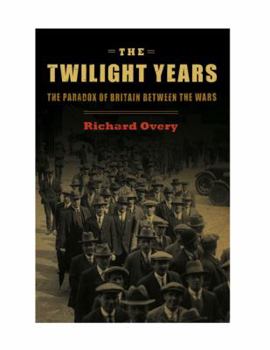The Twilight Years: The Paradox of Britain Between the Wars
Select Format
Select Condition 
Book Overview
Award-winning historian Overy argues that the coming of World War II was almost welcomed by Britain's leading thinkers, who saw it as an extraordinary test for the survival of civilization--and a way of resolving their contradictory fears and hopes about the future.
Format:Hardcover
Language:English
ISBN:067002113X
ISBN13:9780670021130
Release Date:October 2009
Publisher:Viking Books
Length:522 Pages
Weight:1.85 lbs.
Dimensions:1.6" x 6.2" x 9.1"
Age Range:18 years and up
Grade Range:Postsecondary and higher
Customer Reviews
2 ratings
An Interesting Perspective on Britain between the Wars
Published by Thriftbooks.com User , 14 years ago
There are many books out there which discuss the status of Britain between the first and second wars. This one is somewhat unique in that the author focuses on ideas ("social, cultural and intellectual world"), rather than events, as the centerpoints of his analysis. The author concisely summarizes his approach and concerns in a "chronological introduction" to Britain 1919-1939. Next he briefly discusses the emotional tone present during the period--fear of war, the end of civilization, and a general feeling of dread. The first full chapter is probably the most interesting since it deals with the impact of the first war on the British psyche. Given the intense fear a new war, and its potential as a death blow, ideas such as civilization facing a crisis, impending decline and collapse, a new dark age with barbarians at the gates were prevalent. The old Victorian confidence in inevitable progress is clearly challenged. A very good second chapter discusses the perception that abusive capitalism had caused the British decline, and the author effectively discusses the ideas of the Webbs, J.A. Hobson, J.M. Keynes, G.D.H. Cole, Cyril Joad and others. Much discussion of social injustices caused by capitalism occurred during this period, and some advocated economic planning as a solution, which in fact occurred with Labour's victory in 1945. The next several chapters discuss some key ideas, but they seemed at times overly detailed to me. The first talks about the interest during the period in eugenics, sterilization and birth control to preserve "the race." Ironically, the same kind of discussion was going on in this country as well. The impact of Freud's ideas is the subject of an interesting chapter. All this talk about the unconscious and the arrival of psychoanalysis presented such a challenge to rationality as a controlling influence, that it scared the devil out of many Britons. On top of this, further chapters discuss the fear of war, pacifist groups, the incredible fixation of the population on Hitler and what he would do next, and the Spanish Civil War which many saw as the last chance to stop Fascism short of Britain going to war itself. When war did finally come, the contrast between the high spirits on entering the first war and the mood of dark despair surrounding the second is palpable. Given all the traumas and boogiemen that had tortured the British psyche during the interwar period, this "end of civilization" mentality is quite understandable. The book is supported by 88 pages of endnotes and a bibliograph/list of sources of 26 pages, well as abundant illustrations. This is a complex period, and although we have long known what happened, this book helps us understand why events occurred. A bit wordy though it may be, it makes a distinct contribution to our historical understanding of these vital 20 years.
Twilight and Paradox
Published by Thriftbooks.com User , 14 years ago
Through the lens of history, the two decades that comprise the inter-war years might well be called World War 1.5. While the League of Nations struggled to enforce the Versailles Treaty, trouble brewed throughout Europe, leading to what many argue was the inevitable build-up to World War 2. Author Richard Overy describes the era in //The Twilight Years//, a thoroughly researched account of Britain between the wars. Although some have called the period between 1919-39 "the twenty glorious years," Overy contends that Britain was overcome by a nihilistic "culture of crisis," during which intellectuals, politicians, scientists, workers, and writers bemoaned the coming end of civilization. Overy focuses his account of the inter-war years on the ideas and issues of the day: capitalism, fascism, and pacifism, as well as psychoanalysis, sex, and eugenics. Overy, a professor of modern history at the University of Exeter, ably examines this critical period in history. The book's introduction provides a comprehensive explanation of Overy's approach to the topic, outlining well his reasons for focusing solely on Britain instead of the whole of Europe--and explaining away omissions that otherwise might be considered detrimental. //The Twilight Years: The Paradox of Britain Between the Wars// is itself a paradox in some ways. It is at once dense and accessible. At times, the conversational writing style belies an assumed level of knowledge that general readers may not have. And, while Overy provides a readable overview of Britain during the era, the text often gets bogged down in minutiae, such as, for example, how many copies of a notable publication were printed in what format in how many editions at what price. Although such details are interesting, the implications of such information often, unfortunately, are not explained. In general, Overy offers no facile explanations of the state of Britain during the inter-war years. He provides ample evidence to describe the various issues that shaped the Empire, but more analysis would be welcome. For example, he shines when explaining the effects on Britain of the Spanish Civil War of 1936-39, but glosses over the Czech crisis in 1938. The final two chapters of the book are more insightful, however, and provide a thoughtful conclusion. //The Twilight Years// fills a gap in contemporary literature about the inter-war years. Complex but readable, ambitious but accessible, it provides an in-depth look at one of Europe's major powers during a troubled and tumultuous era. Reviewed by Kelli Christiansen






